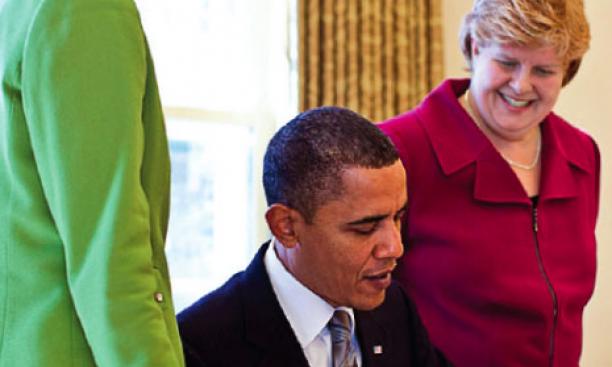

One important reflection of “Princeton in the nation’s service” is the number of our faculty who take one to two-year leaves of absence to serve in positions in the federal government. As much as we miss them while they are in Washington, it is important for the University to facilitate these opportunities. They allow faculty to both serve their country and return to campus with newly acquired experiences and insights that inform their teaching and research. By interweaving the study and practice of public policy, the worlds of government and higher education are both strengthened: scholarly models are tested in the crucible of political reality while governmental policies and decisions are informed by up-to-date social science research.
In the last decade, 10 members of our faculty have taken public service leaves to work in the administrations of George W. Bush and Barack Obama—five for one and five for the other. Undoubtedly the best known member of our faculty to go to Washington since 2000 is former Professor of Economics and Public Affairs Ben Bernanke, who chaired our Department of Economics from 1996–2002 and is among the country’s foremost authorities on monetary policy. He is the only member of this group to “get away,” having decided to remain in government after spending three years as a governor of the Federal Reserve System. Although he left this post to chair President Bush’s Council of Economic Advisers, he returned to the Fed as its 14th chair in 2006 and was recently confirmed for a second four-year term, having played a critical role in leading the country through the worst financial crisis since the Great Depression.
Another distinguished economist to join the Bush administration was Harvey Rosen, Princeton’s Weinberg Professor of Economics and Business Policy and an expert in public finance. In a curious coincidence, he preceded Ben Bernanke as both chair of our economics department and chair of President Bush’s Council of Economic Advisers, but unlike Bernanke, he returned to Princeton in 2005 to take up his new role as the inaugural master of Whitman College. Princeton’s economic expertise is not just sought by Republican administrations. Under President Obama, the federal government has had the benefit of the advice of Wells Professor of Economics and Public Affairs Cecilia Rouse, a specialist in the economics of labor and education, who serves on the president’s three-member Council of Economic Advisers; Bendheim Professor in Economics and Public Policy Alan Krueger, whose work as assistant secretary of the treasury for economic policy has, in his words, “given me a unique opportunity to apply economic research to the severe problems the nation faces”; Professor of Economics and Public Affairs Alexandre Mas *04, the Department of Labor’s chief economist; and Assistant Professor of Economics and Public Affairs Ilyana Kuziemko, deputy assistant secretary for microeconomic analysis in the Department of the Treasury.
In both the Bush and Obama administrations, members of our faculty have been asked to provide the executive branch with strategic counsel and analysis relating to America’s place in the world. From 2003–05, Diplomat in Residence and former Assistant Dean of the Woodrow Wilson School Robert Hutchings chaired the National Intelligence Council, which serves as the intelligence community’s center for midto long-term strategic thinking, including the preparation of National Intelligence Estimates. A similar role is being played by former Dean of the Woodrow Wilson School Anne-Marie Slaughter ’80 as director of the State Department’s policy planning staff. She is an authority on both international law and international relations, and I can think of no one better equipped to carry out the mandate of her office, namely, to serve as “a source of independent policy analysis and advice for the secretary of state.” She was preceded at the State Department by Professor of Politics and Public and International Affairs Tom Christensen, who drew on his expertise on China as deputy assistant secretary of state for East Asian and Pacific affairs from 2006–08.
Policy planning was also central to Professor of Politics and International Affairs Aaron Friedberg’s work as deputy assistant to the vice president for national security affairs in the Bush administration. “I learned a tremendous amount about specific issues, the policymaking process, and the importance (and limitations) of intelligence,” he reflected at the time. “I expect that I will be mulling over my experiences for some time to come, and that they will shape my future research and, perhaps even more, my teaching.”
When one takes into account the many scholars who have served on federal advisory committees, testified before Congress, or provided informal advice to federal departments and agencies, I think it is fair to say that a one-time professor by the name of Woodrow Wilson would be extremely proud of the commitment to public service displayed by Princeton’s faculty today.

